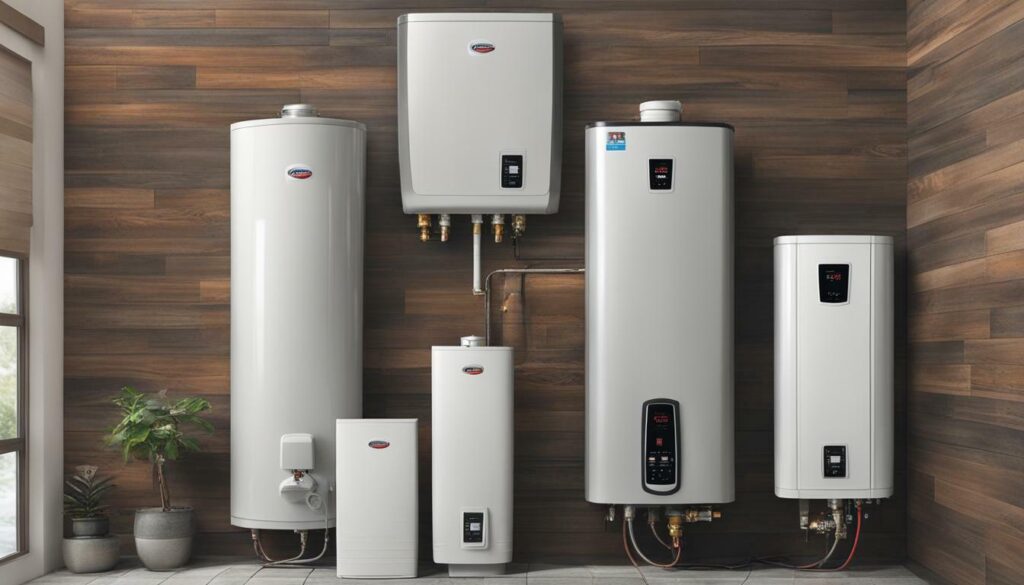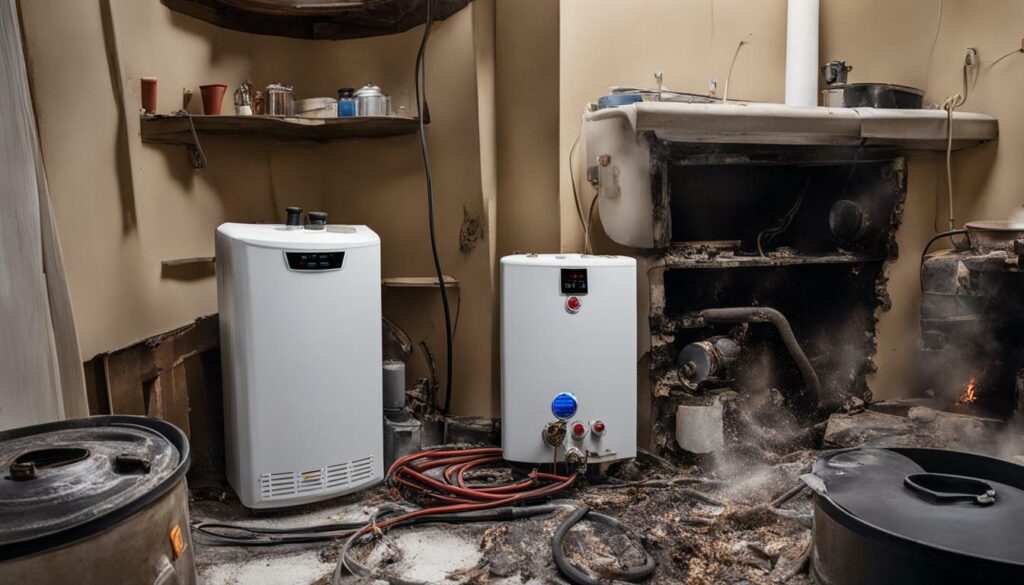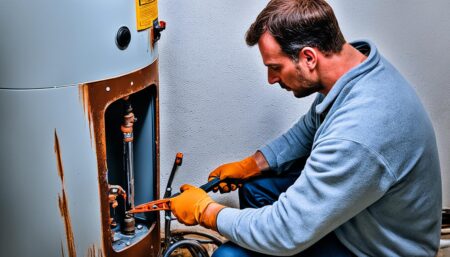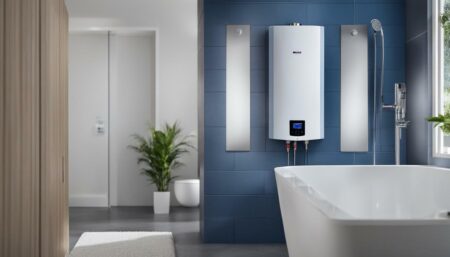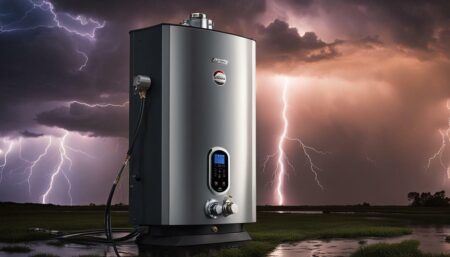Electric tankless water heaters have been gaining popularity in recent years due to their energy efficiency and continuous hot water supply. However, like any other home appliance, they come with their own set of drawbacks and limitations. In this section, we will take a closer look at the potential disadvantages of electric tankless water heaters, helping homeowners make an informed decision on whether this type of water heating system is the right fit for their needs.
- Electric tankless water heaters have drawbacks that homeowners should consider before purchasing.
- Disadvantages include limited flow rate, high initial cost, potential need for an upgraded electrical system, limited capacity, potential flow interruptions, climate considerations, energy efficiency trade-offs, maintenance requirements, and noise levels.
- Despite these drawbacks, electric tankless water heaters offer many benefits such as energy efficiency and a continuous supply of hot water.
- Homeowners should weigh the pros and cons to make an informed decision before investing in an electric tankless water heater.
Electric Tankless Water Heater Drawbacks: Limited Flow Rate
While electric tankless water heaters offer several advantages over traditional tank-based units, they do come with a few drawbacks to consider. One significant downside is their limited flow rate. Unlike tank-based water heaters, which store hot water for immediate use, electric tankless units heat water on demand. This means that they may struggle to provide hot water at a high flow rate simultaneously in multiple areas of the home.
For example, if someone is taking a shower in one bathroom while another person is washing dishes in the kitchen, the electric tankless water heater may not be able to keep up with the hot water demand in both areas. This can result in a significant reduction in water pressure and temperature, leading to an unsatisfactory experience for both individuals.
It’s important to note that the flow rate limitations of electric tankless water heaters can vary depending on the size of the unit and the overall hot water demand in the home. However, in general, these units are best suited for smaller households or homes with relatively low hot water demands.
Despite this drawback, electric tankless water heaters remain a popular choice among many homeowners due to their energy efficiency and continuous supply of hot water. To determine if an electric tankless water heater is the right choice for your home, it’s essential to consider your household’s hot water needs and overall water usage habits.
High Initial Cost
One of the main drawbacks of going electric with tankless water heaters is their high initial cost. While they can save energy and money in the long run, the upfront investment for purchasing and installing these units is generally higher compared to traditional tank-based water heaters.
According to HomeAdvisor, the average cost of purchasing and installing an electric tankless water heater ranges between $1,000 to $3,000. This is significantly more expensive than traditional tank-based water heaters, which can cost between $300 to $1,500.
However, it’s important to note that the long-term savings for electric tankless water heaters can offset the high initial cost. These units have a longer lifespan than traditional tank-based water heaters and can save homeowners up to 50% on their water heating bills.
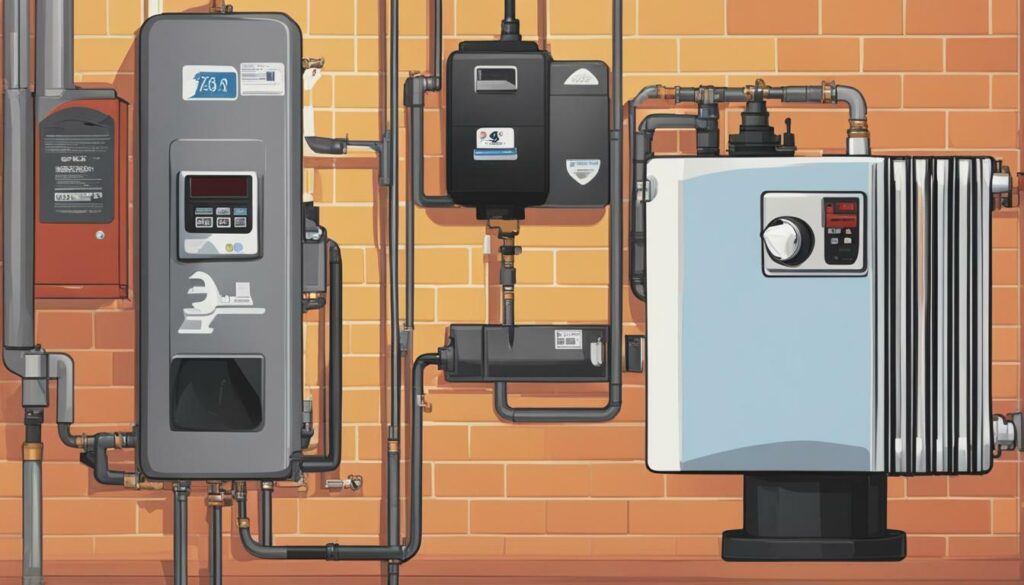
While the upfront cost may seem daunting, it’s important to consider the long-term benefits and savings of going electric with tankless water heaters.
Upgraded Electrical System
One of the problems with electric tankless water heaters is that they require a higher power supply to operate effectively. This may necessitate upgrading the electrical system to ensure that it can handle the increased energy demands of the unit. If you live in an older home, you may need to rewire or upgrade the circuit breaker, which can incur additional costs.
While upgrading the electrical system may be an inconvenience, it is essential for the proper functioning of the electric tankless water heater. Without sufficient power, the unit may not be able to provide adequate hot water or may shut off unexpectedly, causing further problems.
If you are considering an electric tankless water heater, it is important to consult with a qualified electrician to assess whether your home’s electrical system can handle the added power requirements. They can advise you on any necessary upgrades and ensure that the installation is safe and up to code.
Limited Capacity
One of the main issues with electric tankless water heaters is their limited capacity. Unlike traditional tank-based water heaters, which store large volumes of hot water, electric tankless water heaters heat water on demand. This means that they may struggle to keep up with the hot water demands of larger households or homes with multiple bathrooms.
If you have a large family or frequently have guests over, you may find that an electric tankless water heater is not capable of supplying sufficient hot water for all your needs. In this case, it may be necessary to install multiple units throughout your home to ensure adequate hot water supply.
Additionally, if you have appliances that require a constant stream of hot water, such as a dishwasher or washing machine, you may need to install a separate unit dedicated to these appliances. This can add to the overall cost of installing an electric tankless water heating system.
Overall, it is important to consider the capacity limitations of electric tankless water heaters before making a decision. For smaller households with minimal hot water demands, these units can be a great energy-efficient option. However, for larger households or those with high hot water demands, a traditional tank-based water heater may be a more practical choice.
Potential Flow Interruptions
One of the problems with electric tankless water heaters is their potential for flow interruptions. Since these units heat water on demand, they may struggle to keep up with high-demand situations, such as multiple people taking showers at the same time. This can result in brief moments of cold water during use, which can be frustrating and uncomfortable.
This issue can be particularly problematic for larger households or homes with multiple bathrooms, where the demand for hot water is higher. While some larger electric tankless water heaters can handle higher flow rates, they can be costly and may require additional upgrades to the electrical system.
One of the potential drawbacks of electric tankless water heaters is that their performance can be impacted by the climate in which they are installed. In cold climates, the incoming water temperature may be lower, which means that a larger unit or additional equipment may be needed to ensure sufficient hot water supply throughout the home.
This can increase the overall cost of the system, as well as the installation process. Homeowners who live in colder climates should carefully consider the potential costs and benefits of an electric tankless water heater before making a decision.
It’s also important to note that electric tankless water heaters may struggle to perform optimally in areas with hard water. This can lead to mineral buildup within the unit, impacting its efficiency and potentially causing damage over time.
Overall, while electric tankless water heaters offer many advantages in terms of energy efficiency and continuous hot water supply, they do come with several potential drawbacks that homeowners should consider. Factors such as the limited flow rate, high initial cost, potential need for an upgraded electrical system, limited capacity, potential flow interruptions, climate considerations, energy efficiency trade-offs, maintenance requirements, and noise levels should all be weighed carefully before making a decision.
Energy Efficiency Trade-Off
One of the most significant advantages of electric tankless water heaters is their energy efficiency. By heating water on-demand, these units avoid the standby heat loss associated with traditional tank-based water heaters, which can result in substantial energy savings over time. However, homeowners should be aware that there can be a trade-off in terms of energy efficiency. When electric tankless water heaters are used at high flow rates or simultaneously for multiple uses, their energy efficiency can drop. This is because the unit must work harder and draw more power to meet the increased demand, resulting in higher energy consumption and potentially negating some of the cost savings.
It is important to note, however, that even with the potential trade-offs in energy efficiency, electric tankless water heaters are still a more environmentally friendly and cost-effective option than traditional tank-based water heaters in many cases.
While electric tankless water heaters offer many benefits, they do require regular maintenance to ensure they are functioning at their optimal level. As with any water heating system, mineral buildup can occur within the unit over time. This can negatively impact performance and lead to a need for repairs if not addressed promptly.
Descaling or flushing the unit can help remove any mineral buildup and ensure it continues to operate smoothly. However, this process can be time-consuming and require specialized equipment or solutions. It’s important to follow the manufacturer’s instructions carefully and only attempt these maintenance tasks if you feel comfortable doing so.
If repairs are needed, finding qualified technicians who are experienced with electric tankless water heaters can be a challenge. These units are still relatively new on the market and require specific knowledge and skills to repair. This can lead to longer wait times for repairs and higher costs if you need to bring in an outside expert.
What is the Downside of an Electric Tankless Water Heater?
The downside of electric tankless water heaters when it comes to maintenance and repairs is that they require regular attention and specialized knowledge to repair when issues arise. However, by staying on top of maintenance and hiring qualified technicians, you can help minimize the need for repairs and keep your unit functioning at its best for years to come.
“By staying on top of maintenance and hiring qualified technicians, you can help minimize the need for repairs and keep your unit functioning at its best for years to come.”
Noise Level
Another factor to consider when weighing the pros and cons of electric tankless water heaters is the noise level. While most units are designed to operate quietly, some models may produce noise when the heating element is activated. In small apartments or bedrooms located near the unit, this noise may be disruptive.
It is important to note that not all electric tankless water heaters produce the same level of noise. Some units have noise reduction technology or are installed with soundproofing materials to minimize sound. Others may have a higher noise level due to their design or installation location.
To ensure a quiet operation, it is advisable to research the noise level of different models before purchasing an electric tankless water heater. Homeowners can also consider installing the unit in a location that is away from living areas or soundproofing the surrounding area if noise is a concern.
Electric tankless water heaters offer several benefits for homeowners who want a continuous supply of hot water while saving on energy costs. However, it is essential to be aware of the potential downsides before making a purchase decision.
Considerations for Homeowners
When considering an electric tankless water heater, homeowners should take into account the system’s limited flow rate, high initial cost, potential need for an upgraded electrical system, and limited capacity.
There may also be potential flow interruptions during times of high demand, and homeowners in colder climates may need larger units or additional equipment to ensure adequate hot water supply, resulting in higher installation costs.
While electric tankless water heaters are generally more energy-efficient than traditional tank-based systems, their energy efficiency can decrease at higher flow rates or with multiple simultaneous uses.
Maintenance and Noise Levels
Homeowners should also consider regular maintenance requirements, such as descaling or flushing, to remove mineral buildup and ensure the system’s longevity. It can also be challenging to find qualified technicians experienced with electric tankless water heaters for any necessary repairs.
Finally, some systems can produce noise during operation, which may be disruptive in certain living situations, such as small apartments or bedrooms located near the unit.
Making an Informed Decision
By weighing the disadvantages and advantages of electric tankless water heaters, homeowners can determine whether this type of system is suitable for their home’s needs. While there may be some drawbacks, many homeowners find the energy savings and convenience of a continuous hot water supply to be worth the investment.



